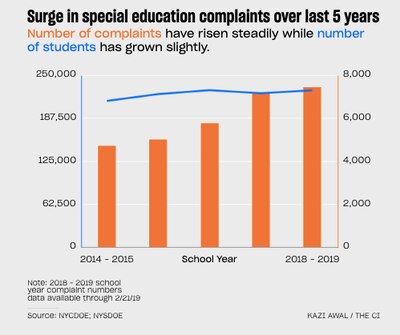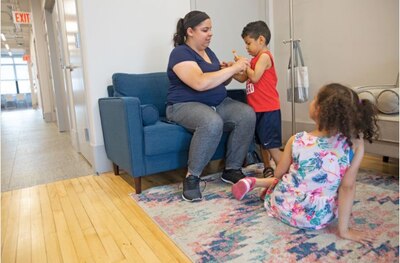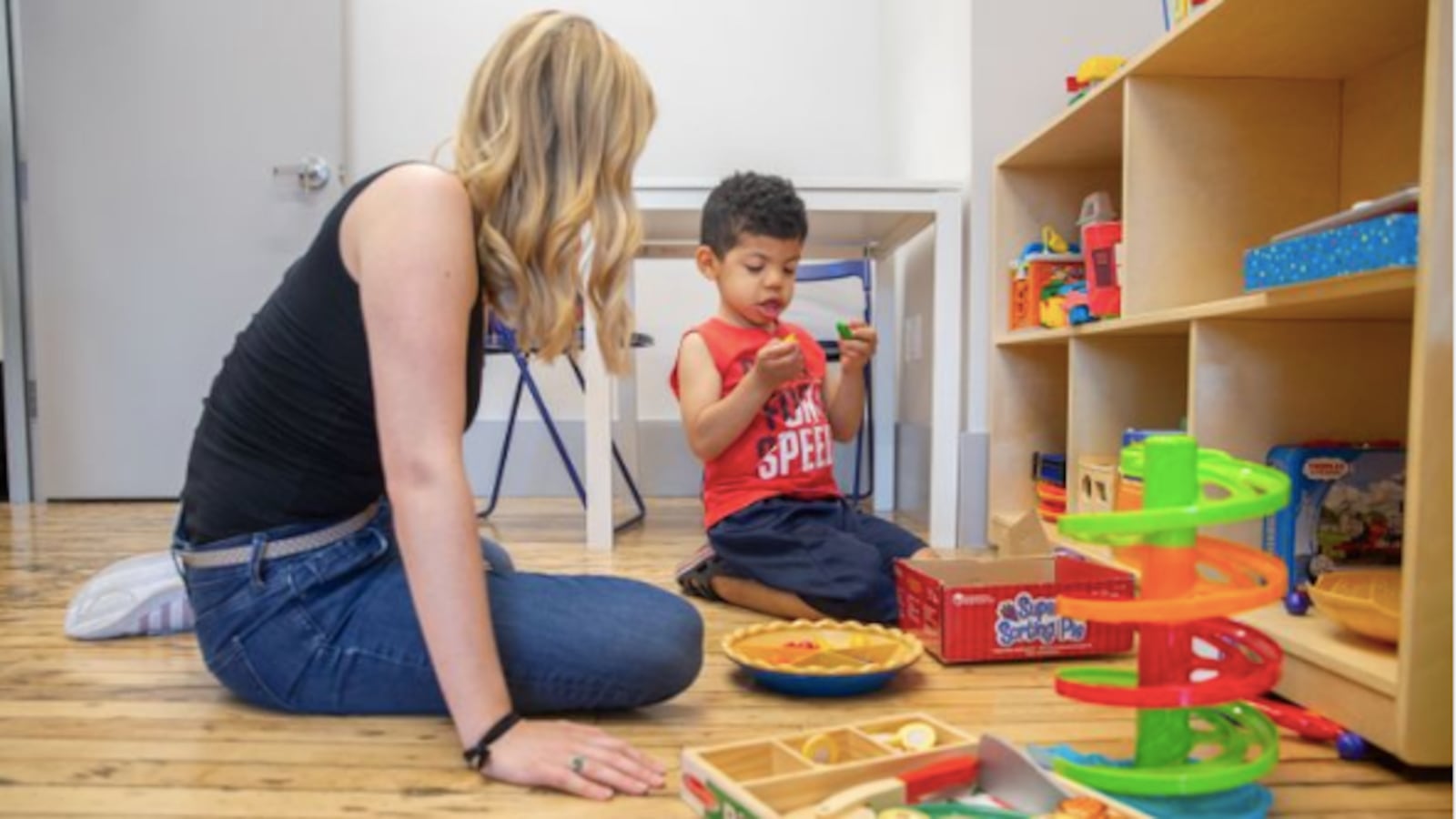
This story was originally published on July 8 by THE CITY.
Some parents say they’ve depleted savings and put jobs on hold as they fight to get their kids necessary special-education services from the city.
Those battles are taking longer than ever because the system designed to resolve parent disagreements with schools — known as impartial hearings — is beset by too many complaints and too few hearing officers, according to a May state Education Department report.
Parents and guardians filed nearly 7,500 due process complaints filed through Feb. 21 of the recently ended school year. Meanwhile, complaints rose more than 50% over the previous three school years, the report found.
Family peer advocate Amber Decker said hearing officers have been playing hot potato for three months with a complaint she filed on behalf of a parent of a child who attends Public School 40 in Manhattan — cycling through 31 refusals to take on the case so far because hearing officers say they’re too swamped.
The complaint seeks speech therapy and paraprofessional services for a first-grader. School officials refuse to provide the help, Decker said.
“These kids are just languishing waiting for impartial hearings,” she said. “It’s a disaster.”
Parents Share Common Stories
Parents and others reached out to THE CITY in response to a survey seeking their experiences with the impartial hearing system, following a story on the scathing state report.
Parents typically request a hearing for one of three reasons: Their child isn’t getting mandated services, requires services the school isn’t willing or able to provide, or needs a different setting or school to get the necessary supports.
Among the common frustrations expressed by parents was how time-consuming and challenging it is to get their children the help they need.
Parents noted that low-income families are at a huge disadvantage because they typically can’t afford to hire lawyers to help navigate the hearing system. They also are unable to shell out money for a school or privately provided services up front, in the hopes of getting reimbursed by the Department of Education later on.
Under the federal Individuals With Disabilities Education Act, all children are supposed to be guaranteed a free, appropriate public education.
A $60,000 Bill
One mom told THE CITY she spent $60,000 on evaluations of her daughter’s needs, legal fees for an attorney to shepherd the complaint, and tuition for a private school where her daughter registered in August 2018.
That same month, she filed a due process complaint seeking reimbursement from the DOE, but didn’t get approved for the tuition payments until May. The funds still haven’t been provided, she said.
Despite the financial hardship, the mom doesn’t question her decision. Her daughter hadn’t been taught to read in a Queens public school by age 7, but learned to do so in one year in the private setting for kids with special needs.
“I’ve basically depleted my life savings with legal fees, evaluations and the $41,000 tuition this year,” said the mom, who requested anonymity because of a non-disclosure agreement she reached with the DOE.
But, she added, her daughter “is thriving — and finally can read.”
Rockaway dad Fred Rodriguez said he drained about $14,000 from his bank account to get his son Connor, who has Down syndrome, out of P.S. 101 in Forest Hills and into the Tiegerman school on Long Island.
Rodriguez said he moved his son from P.S. 101 after winning an impartial hearing against the DOE three years ago.
“We fought for our child since day one, and because of that he has grown to the point where he’s quite high-functioning,” said Rodriguez. “If we would have given up, he would have been a different child. And a lot of parents give up because the city wants to make them run around in circles.”
Rodriguez called himself “one of the lucky ones.”
“If we didn’t have the finances, I would have had to take out a loan — which would have been even more of a financial burden,” he said.
Learning, Interrupted
Challenges in getting services and reimbursements are not new: The city has been out of compliance of federal special education rules for the past 13 years, according to the state Education Department.
In 2014, Mayor Bill de Blasio promised to ease parents’ burdens by speeding decisions on tuition reimbursement. Advocates told THE CITY that instead, an influx of new cases overwhelmed an already burdened hearing system. The number of complaints jumped 51% during the following three school years, the state report showed.
The number of special education students has increased by nearly 20,000 since the 2013-’14 school year, to roughly 224,000 in 2017-18, according to DOE officials.
School officials said they’ve hired 4,300 more special education staffers, including 3,000 teachers, over that same time period. They noted that the state Education Department is responsible for hiring hearing officers.

Since the state report was issued in May, the DOE has submitted a corrective action plan to the state Education Department detailing its strategy for fixing the impartial hearing process and the provision of special education services.
Both agencies declined to provide the plan to THE CITY.
“The impartial hearing process should be as easy as possible for families, and in the last month we’ve begun replacing the impartial hearing data system and formed a new working group with the state to develop long-lasting improvements,” said Danielle Filson, a spokesperson for the city Department of Education.
“This builds on hiring more impartial hearing staff and a $3.4 million investment in improving impartial hearing facilities,” she added. “There is more work to do and we are supporting the state as much as possible to hire more hearing officers.”
Elizabeth Kirk, the mom of three teens who have required special education services, said she doesn’t entirely fault schools that lack the resources to serve special-needs students. But she said it’s the DOE’s responsibility to fill the gaps.
Kirk said she’s filed at least a half-dozen due process complaints over the years — including seeking repayment for evaluations of her kids that their schools in Manhattan refused to do.
“The problem is they don’t do what they’re supposed to do, so you have no choice” but to fight, said Kirk. “Ultimately, if you can’t hire other people to do it, it’s just impossible to work a full time job and take care of your children’s needs. That becomes your job.”
‘I Can’t Work’
Queens mom Mary Delgado knows the feeling.
She’s been transporting her 4-year-old son Joaquin Rodriguez, who has autism as well as medical issues, for therapy sessions in Howard Beach and Rego Park for months.
Joaquin’s preschool placement fell through in the fall of 2017 because the DOE wouldn’t approve a paraprofessional for him — even though St. Mary’s Special Needs Preschool in Queens had accepted him as a student on the condition he be provided with one.
Delgado sad she didn’t learn that the DOE had denied the para until she tried to bring Joaquin to the school, and was told that his spot had been given away.
In January 2018, the DOE suggested a school that didn’t comply with her son’s Individualized Education Program, a legal document known as an IEP, so Delgado filed an impartial hearing complaint.

She was awarded applied behavioral analysis therapy for him at home, physical and occupational therapy in Brooklyn, and speech therapy in Queens — with occasional therapy sessions at Bridge Kids in Manhattan.
“Normally, kids get all these services at school, but he’s not in school,” said Delgado. “I can’t work. This is my full-time job.”
She’s about to get some relief on Monday, however, when Joaquin starts his first real day of school, at The Manhattan Behavioral Center.
Delgado’s attorney, Elisa Hyman, said these kinds of battles with the DOE are par for the course.
“Our clients are experiencing massive problems across the board,” said Hyman. “We have many clients who have been out of school or in the wrong class for extensive periods of time, missed therapies, did not have their IEPs implemented and were not receiving nursing, paraprofessionals, busing services or transportation accommodations.”
About one out of five city public school students has an IEP. DOE officials said they recently added $33 million for new special education services and programs for the coming school year, after spending $5.1 billion in the last school year. That’s out of a city schools budget of more than $27 billion.
This story was originally published by THE CITY, an independent, nonprofit news organization dedicated to hard-hitting reporting that serves the people of New York.

